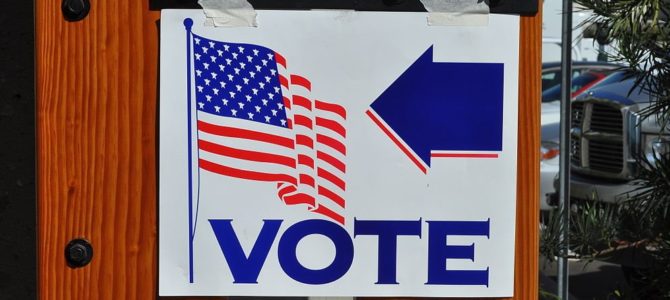
After activist group Black Voters Matter (BVM) sought to claim ballot postage is an example of a poll tax in the state of Georgia, three federal appeals court judges dismissed the request last Friday. It is only the latest example of the left’s organized and strategic initiative to undermine elections across the country by inapplicably invoking “Jim Crow.”
Judges in the U.S. Court of Appeals for the 11th Circuit upheld a prior district-court ruling dismissing BVM’s initiative. The group, an Atlanta, Georgia 501(c)(4) that seeks to eliminate voter identification, joined two registered voters in making the uncompelling claim that absentee ballot postage infringes on the 14th and 24th Amendments to the U.S. Constitution.
“We hold that the fact that absentee voters in Georgia who decide to vote by mail must pay their own postage is not a ‘tax’ or unconstitutional fee on voting,” the court wrote in its opinion, noting on the last page in a footnote that the “Plaintiffs’ claims border on the frivolous.”
“Frivolous,” a common legal term, is certainly one way of defining BVM’s election-disrupting attempt. “Unethical” is another.
Postage Is Not A Poll Tax
Poll taxes, which were outlawed in 1964 by the ratification of the 24th Amendment, disenfranchised blacks and other minorities from post-Reconstruction to Jim Crow. For instance, would-be voters in southern states had to muscle a significant fee. A “grandfather clause” would let poor whites off the hook to vote for free if they had a Civil War veteran relative.
Of course, in no way is requiring people to pay for postage even on the same playing field as this discriminatory process. The Georgia judges made a wise decision, considering voters are not even required to vote by mail — even for absentee ballots.
“Georgia voters, without paying any money, have the option to vote in person, bring their absentee ballot to the county election office, or drop their ballot in a county drop box,” the court’s opinion stated.
Furthermore, the judges acknowledged another important truth in relation to BVM’s botched case. It is perplexing to think requiring a mere postage stamp could violate the Constitution, given service is not free in the United States.
Since would-be voters can take many routes in determining the mode of casting a ballot, choosing to use the government’s unnecessary services in this case would not render such services complimentary. Hence, the ruling states: “The Plaintiffs’ Twenty-Fourth Amendment argument fails because the cost of a postage stamp in this context is neither a penalty nor a tax but is the cost of a service — voters can pay money to have a postal carrier transport their ballot to the county election office instead of dropping it off themselves.”
Voting Has Costs
Michael R. Dimino, a professor of law at Widener University Commonwealth Law School, told The Federalist this and other reasons are why Black Voters Matter’s case was constitutionally doomed.
“Voting always involves some cost, whether that cost is measured in time, gasoline, bus fare, or a postage stamp,” Dimino said. “It is inconceivable that every cost of voting is an unconstitutional ‘poll tax or other tax,’ within the meaning of the 24th Amendment.”
Dimino also said BVM’s notion that voters not affixing a stamp on ballots would constitute a “failure to pay” a “tax” within the meaning of the Constitution is flawed — and that voters clearly have many choices as to how they cast a given ballot.
Ilya Shapiro, director of the Robert A. Levy Center for Constitutional Studies at the Cato Institute, concurred.
“As the court noted, the cost of a stamp is to pay for the delivery of the ballot, not for the ballot itself, so this is quite obviously the correct result,” Shapiro told The Federalist. “Voters are of course perfectly free to avoid that cost by voting in person or dropping off their early/absentee ballot themselves.”
Black Voters Matter did not respond to The Federalist’s request for comment on the court ruling.
Ongoing Efforts To Overturn Voting Laws
While one might look at BVM’s poll tax argument as particularly cretinous, it remains part of a comprehensive effort by Democrats and their allies to overturn voting laws that ought to be seen as fundamentally uncontroversial.
Many Republicans have put forth security measures to mandate voter IDs and ban political actors from passing out food and water to voters at polling places, for instance, while Democrats have sought to loosen voting in various questionable ways, turning election day into election season.
The latest such attempt is H.R. 4, coined “The John R. Lewis Voting Rights Advancement Act,” after S. 1 failed in the Senate. BVM supports the bill, which was approved by the House. This measure aims to grant bureaucrats in the U.S. Justice Department’s Voting Section of the Civil Rights Division the ability to veto election procedure changes in states.
“Think banana republic, where only the incumbents in power can be elected because the elections themselves are shams,” Cleta Mitchell, a senior legal fellow for election integrity at the Conservative Partnership Institute, described the potential law in The Federalist recently.
The left’s efforts to juxtapose Jim Crow policy with 21st-century voting laws are not only disrespectful to blacks who endured discrimination and worse, but toxic to a functioning republic. Such rhetoric extends all the way to President Joe Biden himself, and will only culminate in electoral turmoil.









